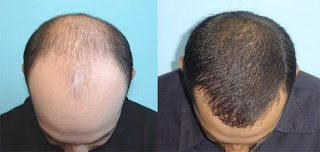Tips for Recovering After Hair Transplantation Surgery
Educational, Hair Restoration Surgery Hair Transplantation in Mumbai, Neograft, Recovery Period advanced hair loss causes treatments, Atlanta hair loss, Atlanta hair restoration, Atlanta hair surgery, Atlanta hair transplantation, complications from hair transplant, fue hair transplant recovery timeline, hair transplant aftercare, hair transplant donor area healing time, hair transplant recovery process, hair transplant surgery recovery, how long is recovery after hair transplant, post hair transplant care, recovering after hair transplant, what to do after hair transplant
At The Griffin Center of Hair Restoration and Research, we have been providing our patients with a variety of options in both surgical and non-surgical hair restoration for forty years. During that time, we have helped thousands of men and women with both follicular unit grafting (FUG) and follicular unit extraction (FUE) hair transplantation techniques, and while we have spoken about how to prepare and what to expect on the day of a hair transplantation procedure, many still have questions about what happens afterward. Proper care and maintenance after surgical hair restoration is an extremely important part of the process and helps ensure that you achieve satisfactory and long-lasting results. Here are some helpful things to consider while recovering after a hair transplant procedure.
In the best hair transplant in Delhi, the graft is created by removing tissue from the donor zone.Hair follicles naturally go through a regular cycle of shedding and regrowth throughout their lifespan and the stress of a transplant can temporarily transition them into the resting, or telogen, phase. This means that after a hair transplant procedure sometimes the new hair follicles will shed their hair. This side effect, called “shock loss,” is only temporary. In general, the telogen phase lasts approximately 100 days, and so new hair will begin to grow back within two to four months. However, because hair grows in cycles, all of the new grafts may not all start growing at the same time. Ultimately it may take as up to eight to twelve months before all the new grafts are showing new hair growth. Occasionally patients will continue to see more hair growth a year or more after the procedure.
Recovery time is generally minimal after either form of hair transplantation procedure since people seldom use their hair or scalp to perform everyday tasks. However, we do recommend that patients take it easy for two to four days following their surgery, and refrain from strenuous activity or exercise for at least one week. New hair follicles require a plentiful and steady supply of blood to flourish, and excessive stress or exertion can compromise the body’s natural blood flow. Patients should wait until the staples are removed from the donor site, seven days after the surgery, before getting a haircut and should not color, perm, or chemically treat the hair in any way for at least a full month after their procedure.
Finally, it is vitally important to follow up any hair transplant procedure with a regular maintenance plan to help preserve the hair you have. Hair loss is a progressive process and hair transplantation surgery only moves healthy hair follicles into thinning areas; it does not prevent further hair loss from occurring in the other, non-transplanted follicles. Every patient is different, and so a comprehensive maintenance plan may consist of a variety of treatment methods ranging from topical or oral prescription medication like minoxidil or finasteride, to specially blended formulas, to advanced technology like red light laser therapy, depending on the patient’s specific needs. Regardless of which treatment method, or combination of methods, is recommended, it is imperative that every patient follow those recommendations diligently. Failure to do so may result in the loss of even more hair, not from the transplanted follicles but from the old follicles that were already there, making it seem as though no progress was made at all.
Every case of hair loss is different and individual healing factors and recovery times can vary, so be sure to keep an open line of communication so that we can make sure that everything is going according to plan. If you are suffering from hair loss and would like to learn what we can do for you, please contact The Griffin Center of Hair Restoration
Before you book an appointment for the Hair Transplant in Bangalore, read the following so that you will know about the hair transplant surgery.




Super and helpful information for all. Thanks you so much for sharing with us.
ReplyDeleteHair Transplant
We should take care of our hair, its as important as other parts of the body. But if you are facing hair loss due to certain reasons and looking for best surgeon for surgery then Dr. Mohan Singh known as the best surgeons in India provides Hair Transplant surgery. We provide best quality treatment with 100% success rate. For more info click on the link.
ReplyDeleteNice blog thanks for sharing with us...
ReplyDeleteI have just stumbled upon your blog and enjoyed reading your blog posts very much.
If you are facing the hair loss problem then you can visit the DermaClinix in Delhi, they offers the best treatment of hair transplant in Delhi.